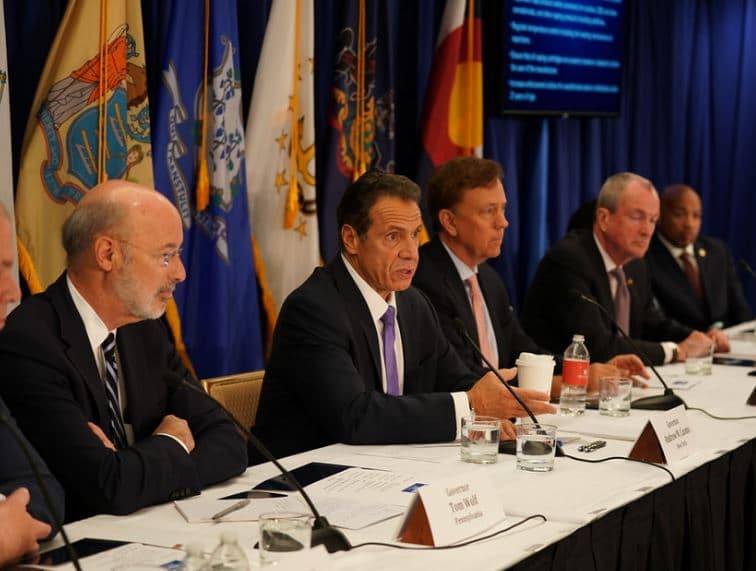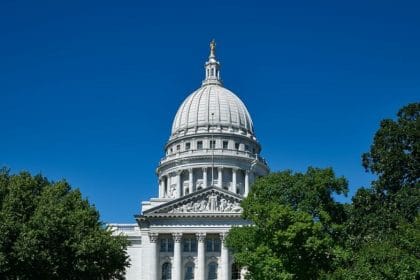Governors Hold Summit on Regional Approach to Cannabis and Vaping Legislation

The governors of five northeastern states came together for a summit on Thursday to discuss the outlines of a joint regional approach to cannabis and vaping policies.
“This issue is complicated, controversial and consequential. It is probably one of the most challenging I’ve had to address in New York, and it’s a challenge for all the states,” said New York Governor Andrew Cuomo, who co-hosted the event with several of his counterparts.
“The goal of this summit is to collaborate with one another, share resources and think collectively as we all try to figure this out,” he said. “The federal government is supposed to get involved in issues that go beyond one state’s borders, but that is not happening on any issue facing the country.
“The states are on our own, so we are working together to find regionally coordinated solutions to protect the public health,” Cuomo added.
The other governors participating in the Regional Cannabis Regulation and Vaping Summit were Connecticut Gov. Ned Lamont, New Jersey Gov. Phil Murphy, Rhode Island Gov. Gina Raimondo, and Pennsylvania Gov. Tom Wolf. All of the participants are Democrats.
They were joined by legislative leaders and other officials from their respective states, and following the summit the governors released a set of core principles on issues related to market regulation and empowerment; public health; public safety and enforcement; and vaping legislation best practices.
“Whether it comes to the emerging public health issues surrounding vaping and e-cigarettes, or the use of marijuana, permitting the illegal market to run unregulated, which is what is currently happening, is neither safe nor is it in the best interests of all our residents,” Gov. Lamont said.
“Cooperating as a coalition of states on these issues is the best path forward—as we not only share borders, but we share economic interests, public health priorities, and a joint understanding that the more states that work together on these kinds of issues, the better the policy results will be for our residents,” he said. “On these issues and more, when states work together collaboratively, carefully and thoughtfully we can create better policies.”
Gov. Murphy agreed, pointing out that while states can obviously go it alone when grappling with a public health issue, “these actions will be strengthened and magnified when we know there is a similar strategic approach in … other states.
“Our impact is much greater when we break out of our own silos as individual states and collaborate on the tough issues plaguing our region and nation. Together, we can ensure that these challenges are met with thoughtful, comprehensive action for those who live and work in our region,” he said.
MARKET REGULATION AND EMPOWERMENT
A number of summit participants spoke of the challenges of financial services for state-licensed medical marijuana businesses because of the Federal Controlled Substance Act. Noting that so long as it remains difficult to open and maintain bank accounts, the state-legal marijuana industry will largely rely on cash to conduct business and operate, which results in public safety issues and creates unique burdens for legal marijuana businesses.
The governors agreed to a series of principles to setting a cannabis tax structure, as well as best practices to ensure communities have access to the new industry.
Among other things, the states agreed to move forward in identifying best practices with regard to the basis for taxation, implementation stages and dynamic market-based controls for cannabis production and cultivation; supporting a fair and competitive market architecture as cannabis regulations are adopted; encouraging a stable regional market by identifying and implementing a similar overall effective tax rate for cannabis products; incorporating tax mechanisms, such as weight based, potency based, and/or mg/thc based, to ensure price stability for licensees and that the price of cannabis does not fall to a point that increases access and use beyond current usage rates; providing positive guidance to their state chartered financial institutions with respect to cannabis-related banking services; and prioritizing small and diverse businesses’ participation in the cannabis industry;
The governors also vowed to support and advocate for the passage of the Secure and Fair Enforcement (SAFE) Banking Act, which would provide clarity and remove disincentives for existing financial institutions to service cannabis-related businesses. The Safe Act was passed by the House in September.
PUBLIC HEALTH
The governors agreed to a series of principles regarding product safety and testing of cannabis products; best practices for safety and contamination; and availability and advertising of products, focused on restricting access to and advertising aimed at youth users and vulnerable populations.
These guidelines include enacting restrictions for cannabis and vaping product forms, packing, advertising and characteristics that target minors; prohibiting advertising that promotes overconsumption and targets youth; restricting sale of products to adults 21 and over and imposing strict penalties on licensees that sell to youths; enacting requirements that all cannabis products must be contained in child-resistant packaging; regulating cannabis products and enacting restrictions in a manner that safeguards public health, limits over consumption and discourages the spread of cannabis use disorder.
“It’s imperative that we focus on bringing the conversation about cannabis into the open and making sure there is proper regulation,” Gov. Wolf said.
“When we establish a marketplace for cannabis, social justice and empowerment initiatives must be considered,” he said.
VAPING
Officials testifying before the governors said e-cigarette use among young people is staggeringly high.
In 2018, 1.5 million more students used e-cigarettes than in 2017, and high school electronic cigarette use in 2018 was 78% higher than it was in 2017, the Centers for Disease Control has said.
The governors agreed to ban or more tightly regulate the sale of flavored vape products to reduce the product’s attractiveness to youth; implement vape product safety standards for nicotine, CBD and other cannabinoids; regulating temperature control, including the heating mechanisms of vaporizers; increase enforcement actions for unauthorized sales to individuals under 21 years of age; and restricting advertisements to ensure products are not targeted to minors.
Rhode Island Gov. Raimondo said in the absence of federal leadership, the governors had to come together and take a regional approach to vaping and cannabis regulations.
“The principles we’ve agreed to today will allow us to better coordinate our efforts as we address some of the most challenging issues facing our states. Through this partnership, we will work together to protect families from the dangers posed by the illicit cannabis market and vaping,” she said.
























